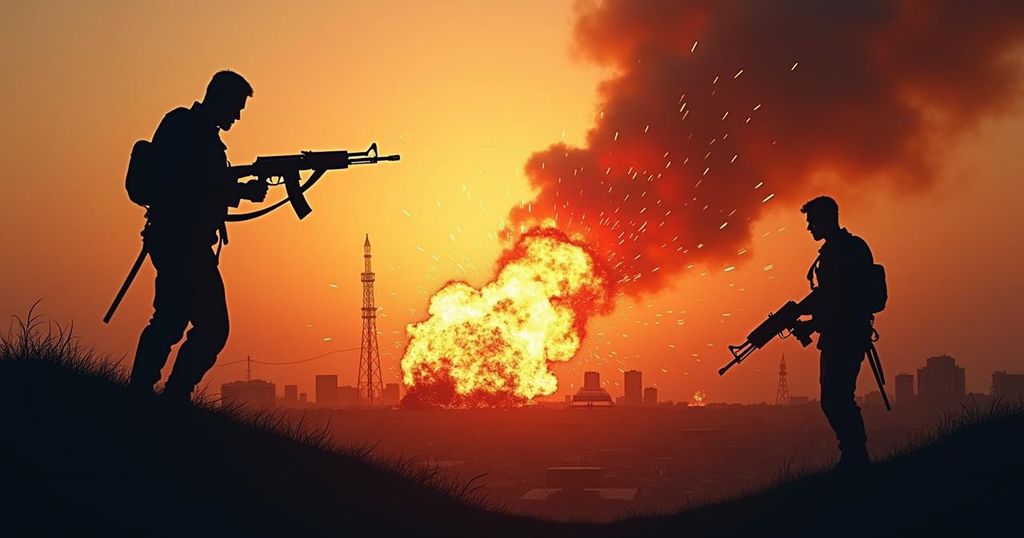Escalating Tensions: Israel and Iran on the Brink of Catastrophic Conflict

Iran has launched a significant missile attack against Israel, aiming at crucial military sites in response to prior assassinations of key leaders from Hezbollah and Hamas. While most missiles were intercepted, some did cause damage. This escalation draws both nations closer to a potential war with serious repercussions. Israeli leaders are now considering a bolder military response, particularly concerning Iran’s nuclear capabilities as regional tensions rise.
The recent unprecedented missile attack by the Iranian Revolutionary Guard Corps and the Iranian army against Israel marks a significant escalation in hostilities between the two nations. Iran launched approximately 180 missiles aimed at key military installations, including three air force bases and the Mossad headquarters, as a response to the assassinations of prominent leaders from Hezbollah and Hamas. While Israel, supported by the United States and Jordan, successfully intercepted a majority of these missiles, several struck military and civilian targets, causing limited damage and few casualties. This incident brings Israel and Iran closer to a potential full-scale war, with implications that could reverberate throughout the Middle East and beyond. The prospect of such a conflict raises alarms due to possible catastrophic consequences, both conventionally and in terms of nuclear warfare. The rapid nature and scale of this latest Iranian assault—dubbed a surprise attack, unlike a previous incident in April—suggest an increasingly aggressive Iranian posture, stemming from perceived threats to its influence and stability within the region. Both Iranian and Israeli leadership are poised to respond to this escalation. Iran has publicly signaled intentions to target Israeli civilian infrastructure in future attacks, while Israeli decision-makers are contemplating a more robust military response than previously executed. Historical misinterpretations of earlier Israeli military actions did not deter Iranian aggression, prompting Israeli strategies to shift towards more direct military interventions against Iranian positions. Potential targets for Israel include missile bases and strategic structures within Iran, although the contentious issue of attacking Iran’s nuclear facilities remains debated. Israeli decision-making is influenced by the operational feasibility of such strikes, expected consequences from regional actors, and the implications of U.S. foreign policy, particularly under the current administration. Recent developments reflect a notable increase in public discourse within Israel regarding the Iranian nuclear threat, driven by advancements in Iran’s nuclear capabilities and rising calls within Iran to acquire nuclear weapons. Factors such as weakened Hezbollah and heightened trauma from prior confrontations may motivate Israeli leaders to adopt a more aggressive stance. The advancing situation necessitates careful deliberation and strategic communication to avoid rash decisions. History teaches the value of measured responses, illustrated by President John F. Kennedy’s handling of the Cuban missile crisis, where considered communication and consultation ultimately prevented escalation. It is hoped that contemporary leaders will heed the lessons of history to navigate the present tensions judiciously.
The ongoing hostilities between Israel and Iran represent a complex geopolitical conflict with roots in ideological, military, and territorial disputes. The recent missile strikes serve as a catalyst revealing the fragile security dynamics in the region. As Iran asserts its military capabilities and engages in direct threats against Israeli interests, the potential for a broader conflict looms larger, especially as both sides recalibrate their military strategies in response to escalating hostilities. The fragile balance of power in the Middle East requires strategic patience and diplomatic engagement to avert disastrous outcomes.
In conclusion, the persistent conflict between Israel and Iran escalates dangerously with each aggressive military action. The international community must observe closely and encourage robust communication between the involved parties to mitigate the risk of a catastrophic war. Learning from historical precedents, such as the Cuban missile crisis, it is imperative that leaders on both sides exercise caution and strategic foresight amidst rising tensions.
Original Source: thehill.com








